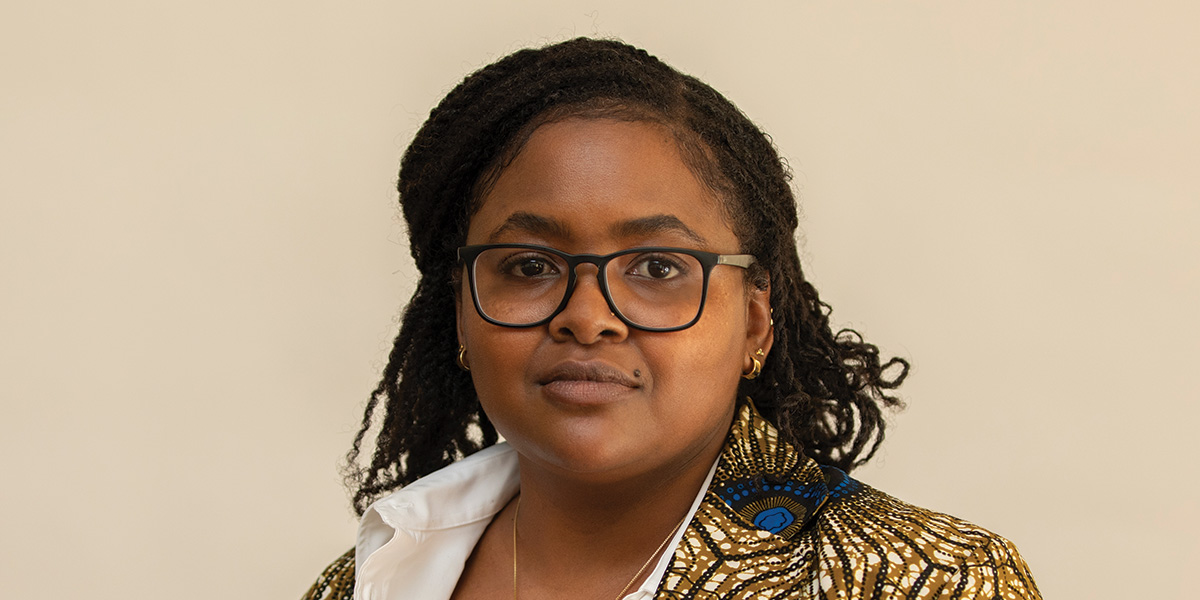Decker College alum makes a global impact on nursing
Rachel Kimani '12, MS '14, DNP '15, is a researcher, educator and volunteer

For Rachel Kimani ’12, MS ’14, DNP ’15, the nursing field has extended far beyond the walls of a hospital.
As a researcher based in New York City, she’s worked to shed light on factors affecting maternal child development, health inequities and the impacts of addictive disease and medical complications.
As an educator, she’s helped a team devise and implement an advanced-practice nursing curriculum for a university in Kenya.
And as a volunteer, she’s mentored incarcerated teenage girls in Africa to help them gain valuable skills for when they’re released.
Kimani credits Binghamton University’s Decker College of Nursing and Health Sciences with helping her discover an expansive career path she never considered while growing up in Kenya before moving to the U.S. Back then, a hospital was the last place she wanted to be.
“Hospitals look very different in Kenya, and for a time, it was enough to make me not want to go into the medical field,” Kimani says. “I did like the basic sciences, though, and after earning my bachelor’s degree [in nursing] and entering the master’s program, I discovered a whole area of research that truly fascinated me.”
Kimani specializes in community health nursing. As an instructor in clinical investigation at Rockefeller University in New York City, she’s part of a team that draws upon areas of biology, chemistry and physics for research that helps advance new ways of treating patients.
“You need people to bridge the differences between research in the laboratory and using that research to better treat humans,” Kimani says. “In the end, we are trying to improve human beings.”
Kimani joined Rockefeller University as a clinical research nurse practitioner in 2015. Before that, she worked five years as a registered nurse at Lourdes Hospital in Binghamton, N.Y.
Even though she found the daily pace of the hospital’s emergency department exciting, Kimani was eager for new opportunities.
In 2015, she found one as a research nurse practitioner at Rockefeller University, a first step toward her current position there.
“I just like the idea that people investigate things through this type of research, and then those things are converted into practice,” Kimani says.
Returning to Kenya
Kimani had performed research in Kenya while working toward her Doctor of Nursing Practice (DNP) degree at Binghamton, which she earned in 2015, but she didn’t expect her professional life would one day take her back. After three years at Rockefeller, she chose to explore international work.
She decided that a position at the Aga Khan University School of Nursing and Midwifery in Kenya would allow her to make the most impact.
As part of a team that included experts from the United Kingdom, Kimani worked from 2019 through 2022 to help develop a nurse practitioner curriculum at the university.
After the revised program launched, it showed early signs of success. It drew students from Pakistan, Botswana and other African countries because it was among a few programs in that part of the world that met the criteria of advanced practice nursing in accordance with the International Council of Nurses.
“Nurses in Kenya have to do a lot, so in rural areas they had been prescribing medicine and ordering tests because they don’t have many clinicians,” Kimani says. “This program will be even greater for Africa as a whole because we’ve been struggling to push the nurse practitioner role across that continent in general.”
Embracing new challenges
Kimani also used her time in Africa to volunteer as a mentor at a prison for teenage girls.
“What I tried to do for them was figure out plans to get educated, so they don’t have to end up on the streets when they get out,” Kimani says. “Some of their stories were very heartbreaking.”
By July 2021, Kimani was back at Rockefeller University as an instructor in clinical investigation. Her experiences have reinforced a belief that research is most effective through collaboration.
“We need to think to ourselves as we conduct our research about how we have helped,” Kimani says. “How have we worked with people? And most importantly, how have we lifted them up?”

